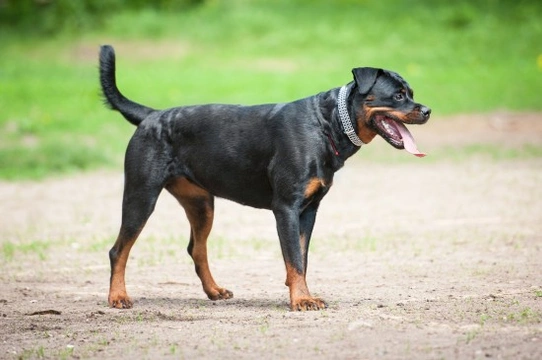
Rottweiler hereditary health and health testing
The Rottweiler is a large dog breed that originated in Germany, and is a very versatile dog that has been used in a wide variety of working roles including livestock herding and guarding, pulling carts, and for guarding property and people. The breed as a whole is one that is often misunderstood and somewhat misaligned, as their formidable appearance and strong protective instincts tend to mean that they are widely portrayed as aggressive, unpredictable dogs in films and on TV, when in reality, they tend to be calm, loyal and trustworthy.
The Rottweiler can stand up to 27” tall at the withers and weigh up to 130lb, with males of the breed being larger than females. They are stocky and muscular, and very strong, and tend to be slow moving and rather sedentary, which does mean that they have a tendency to run to fat if their food and exercise isn’t in balance. They make for excellent pets and working dogs for all sorts of people, but do require a confident owner that can manage and handle a large, powerful dog.
If you are considering buying or adopting a Rottweiler, it is of course important to do plenty of research into the breed itself and its core traits, including the general health and longevity of the breed as a whole. We will cover these elements in more detail within this article.
Rottweiler longevity
The average lifespan of the Rottweiler is 8-10 years, which is lower than the 12 years or so that is the average across all dog breeds of all types. However, large and muscular dogs tend to live shorter lifespans than their smaller counterparts, and at the top end of the scale, 10 years of age falls within the low average for breeds of a similar size and build.
Rottweiler genetic diversity
The coefficient of inbreeding figure for the Rottweiler breed as a whole is 6%, which is just within the accepted norm for pedigree dog breeds of 6.25% or lower. This indicates that the breed as a whole is not prone to a significant amount of inbreeding in order to keep breed lines viable.
Rottweiler conformation
The shape and build of the Rottweiler is heavy and muscular, but reasonably well balanced and in proportion. Like all large, deep chested dog breeds, the Rottweiler is at potential risk of developing bloat or gastric torsion, an acute condition that causes the stomach to fill with gas, and potentially flip over on itself.
Health testing for the Rottweiler
The British Veterinary Association and The Kennel Club recommends a number of health tests for the Rottweiler, in order to ascertain the potential to certain breed-specific health problems prior to breeding. Such tests include:
- Hip score testing, with the mean score for the breed as a whole being 9.7. Rottweilers are one of the breeds most prone to hip dysplasia, with an estimated 50% of the breed afflicted with the condition to some extent.
- Elbow score testing, with the ideal elbow score being zero.
- Testing for a range of eye conditions, including progressive retinal atrophy, multifocal retinal dysplasia, and persistent pupillary membrane.
Rottweiler breed clubs and organisations also make the following recommendations for Rottweiler breeders:
- Bitches under two years of age not to be bred from.
- Bitches to produce no more than one litter within any twelve month period, and no more than five litters in their lifetime.
Other health issues
As well as the concerns and conditions mentioned above, the Rottweiler breed as a whole is one that may potentially be afflicted by a reasonably wide range of other health problems too. Known health issues that may arise in Rottweilers, but for which no pre-breeding health screening is currently available are:
- Ciliary dyskinesia.
- Laryngeal paralysis.
- Neuroaxonal atrophy of the muscles.
- Leukoencephalomyelopathy, a condition that tends to affect young dogs.
- Narcolepsy.
- Renal dysplasia.
- Pyometra of the womb in female dog of the breed.
- Urinary sphincter mechanism incontinence.
- Generalised immunodeficiency syndrome.
- Hypoadrenocorticism, an underproduction of the necessary thyroid hormones.
- Problems with the cranial cruciate ligaments in the front legs.
- A range of heart problems, including aortic stenosis and dilated cardiomyopathy, which may lead to heart failure.
- Pyotraumatic folliculitis, or hot spots on the skin.
- A particular susceptibility to contracting parvovirus.
- Osteochondrosis of the shoulder, leading to osteoarthritis.
- Various types of cancers, including bone cancers, histiocytic sarcoma, squamous cell carcinoma, and subgenual malignant melanoma.
- Panosteitis, an inflammatory condition of the bones.
- Entropion of the eyelids, which may cause them to rub on the cornea.
- Cataracts of the eyes, although these are generally operable to preserve vision.
- Distichiasis, in which the eyelashes grow a secondary row that may rub on the eyes.
- Medial canthal pocket syndrome of the eyes.
- Muzzle folliculitis, a form of canine acne.
- Haemophilia, a clotting disorder of the blood.



